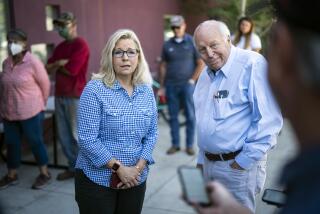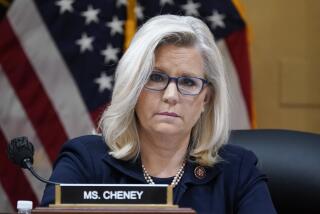Cheney Rules Out Run for White House : Presidency: Former defense chief cites burdens of campaign. He was seen as a weak contender for likely GOP front-runners, Dole and Gramm.
- Share via
WASHINGTON — Former Defense Secretary Dick Cheney, who spent much of the last year taking soundings on a possible 1996 Republican presidential candidacy, announced Tuesday that he has decided not to make the race.
The 53-year-old veteran of the Gerald R. Ford and George Bush administrations told friends he has concluded that the rigors of the campaign would be too much for him and his family. “He said the cost was too high in personal terms,” said one longtime supporter. Cheney and his wife, Lynne, former chairwoman of the National Endowment for the Humanities, have two children.
“I appreciated very much the kind words of encouragement and support I received from the many Americans who had urged me to seek the presidency,” Cheney said in a brief statement released here. According to aides at his political action committee, he campaigned last fall in nearly all of the 50 states on behalf of scores of GOP candidates as he sought to evaluate his own chances for the White House.
“He is a quality person who would have been a formidable presidential candidate,” said Sen. Bob Dole (R-Kan.), who is expected to seek the presidential prize.
Republican professionals said that Cheney, whose name recognition among voters has yet to match his reputation for intelligence and sound judgment among Washington insiders, would have had difficulty raising the more than $20 million deemed necessary to pay the bills for the nominating contest.
In a sense, Cheney’s candidacy may have been a victim of the political misfortune that befell Democratic President Clinton in the second year of the presidency. When Cheney first began seriously considering running for the White House, his background as Pentagon chief during the Persian Gulf War was considered a prime asset, particularly because foreign policy was seen as the chief weakness of a President who was putting his emphasis on domestic policy.
But the collapse of Clinton’s drive for health reform, along with the massive GOP victory in the November congressional elections, undermined the President’s hopes for domestic accomplishment and left him scrambling to catch up with Republicans’ agenda to cut government and trim spending. These events appeared to boost the presidential stock of at least two Republicans: Dole and Sen. Phil Gramm of Texas. Both can claim greater experience on domestic issues than can Cheney.
Meanwhile, foreign policy has provided some of the few trump cards in Clinton’s hand, thanks to his apparent success so far in restoring and stabilizing democratic rule in Haiti, in negotiating an easing of the nuclear threat from North Korea and in promoting peace settlements in the Middle East.
With the official start of the 1996 campaign still a year away, the environment for Republican hopefuls stands in sharp contrast with the atmosphere for Democrats in 1991, when they pondered challenging President George Bush.
Because of the Gulf War victory, Bush was seen as all but invincible, a factor that discouraged most prominent Democrats from entering the race. On the other hand, Republican prospects now seem bright because of Clinton’s perceived weakness, and the GOP’s top leaders--including Dole, Gramm and former Vice President Dan Quayle--are expected to compete for the right to challenge him.
But even if Republicans have good reason for optimism, money is expected to be a limiting factor. Because a number of big states seeking greater influence in the nomination process have moved up their delegate contests, political professionals say the need to raise huge funds early in the campaign will be greater than ever in 1996.
Some believe that the net result of Cheney’s decision not to run will benefit Gramm and Dole, generally perceived as the two GOP front-runners. “It just means that there is one less person who could dip into their potential financial and political base,” said one GOP strategist who is neutral in the race.
But one former Cheney supporter said the decision would most benefit former Tennessee Gov. Lamar Alexander, who bills himself as an outsider. “People who wanted Cheney because he was a fresh face will take a look at Alexander now.”
‘Contract With America’
* The full text of the Republican “contract with America” is available on the TimesLink on-line service. Also available are biographies of Newt Gingrich and up-and-coming GOP leaders. Sign on and click “Special Reports” in the Nation & World section.
Details on Times electronic services, B4
More to Read
Get the L.A. Times Politics newsletter
Deeply reported insights into legislation, politics and policy from Sacramento, Washington and beyond. In your inbox twice per week.
You may occasionally receive promotional content from the Los Angeles Times.







